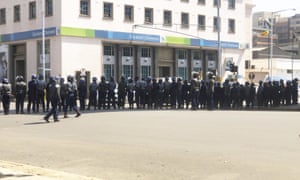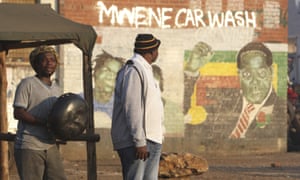Demonstrators warned ‘you will rot in jail’ in run-up to planned rally in Harare

Zimbabwe’s main opposition party has gone to court to lift a police ban on demonstrations scheduled for Friday, as hundreds of police armed with automatic weapons, batons and water cannon set up checkpoints on major roads and blocked access to the party’s offices in the capital, Harare.
The police banned the street demonstration planned by the Movement for Democratic Change (MDC) on Thursday night, after saying it would turn violent, and warned that anyone who took part would be committing a crime.
Police trucks filled the streets of Harare on Thursday, using loudhailers to warn residents “you will rot in jail” if they participated in the demonstrations, while teams searched vehicles at checkpoints on roads leading into the city.
Authorities appear to have been rattled by the planned protests, which were organised by the MDC to protest against the deteriorating economy. The opposition was determined to continue with the demonstrations, said the MDC spokesman Daniel Molokele, adding that a high court judge would preside over the party’s application from 7am (0500 GMT).
In recent months millions have been hit by soaring prices of food and fuel, while foreign exchange shortages have led to a lack of vital medicines and other goods.
Police said they have evidence that the demonstrations would be violent.
“Security services will not fold hands and allow violence, destruction of property, intimidation, threats and clandestine night acts of violent agitation to take centre stage,” said a spokesman, who claimed police had recovered a stash of slingshots and catapults to be used in the protests.
The MDC said its protest would be peaceful. Party officials told the Guardian that the stones had been planted in a bid to smear the opposition.
The first rally is due to be held in Harare, and then in five regional centres.
Via his spokesman the MDC leader, Nelson Chamisa, underlined late on Thursday that the opposition was calling for more than just concessions on austerity.
“August 16 is a special day in this peaceful struggle,” the spokesman said. “Only a legitimate people’s government can deal with the people’s grievances. [We] will engage in a persistent peaceful struggle until Zimbabweis the land of the happy and free. Real change is the only answer to Zimbabwe’s questions.”
The protests come more than 18 months since Emmerson Mnangagwa took power after a military takeover ousted the veteran ruler Robert Mugabe in November 2017. Mnangagwa then went on to win a closely fought and contested election promising investment, transparency and “good days ahead” for the former British colony.

There are widespread fears that any unrest will prompt a brutal crackdown. In August last year six people were killed by troops deployed to clear the centre of Harare after an opposition rally against alleged vote rigging. In January, 13 died and hundreds were raped or beaten as security forces quelled unrest following a hike in fuel prices.
Six anti-government activists have been abducted and tortured in recent days, according to human rights groups. The activists were taken from their homes at night by armed men in unmarked cars, accused of involvement in the protests, stripped, beaten and then abandoned.
Amnesty international criticised “an escalating crackdown against human rights defenders, activists, civil society leaders and members of the opposition, including abductions and torture.”
Cain Mathema, minister for home affairs, warned earlier this week that police were ready to deal with “unruly elements who want to cause alarm and despondency in the country”.
Mnangagwa’s ruling Zanu-PF party, which holds a majority in parliament, is pushing through the maintenance of peace and order bill – which the opposition and human rights activists describe as very harsh. Parliament met through the night to pass the controversial legislation.
On Thursday, the president urged the opposition to engage in dialogue.
“Our strongest asset is our unity. I reiterate my calls to all opposition leaders that my door remains open [and] my arms remain outstretched. Riots [and] destructive violence must be rejected; peaceful constructive dialogue are the way forward,” he said in a statement.
Nick Mangwana, the permanent secretary at the information ministry, issued a statement blaming an unidentified “third force” for the attacks.
The Zimbabwe Human Rights NGO Forum, a coalition of rights groups, said it believed state security agents were responsible for the latest abductions and beatings, which have forced some activists to go into hiding.
Obert Masaraure, the leader of a union representing 30,000 teachers in impoverished rural areas, said he had been forced to flee his home after “state agents” visited.
“No one is safe at the moment. The regime is baying for blood,” said Masaraure, who has been arrested five times since December and has been charged with subversion.
Zimbabwe is crippled by massive debts incurred during Mugabe’s rule and needs a multibillion-dollar bailout to prevent economic collapse. However, continuing repression and a lack of tangible political reform mean there is little chance of international institutions offering major aid packages.
The post Zimbabwe opposition tries to lift protest ban as armed police patrol capital appeared first on Zimbabwe Situation.